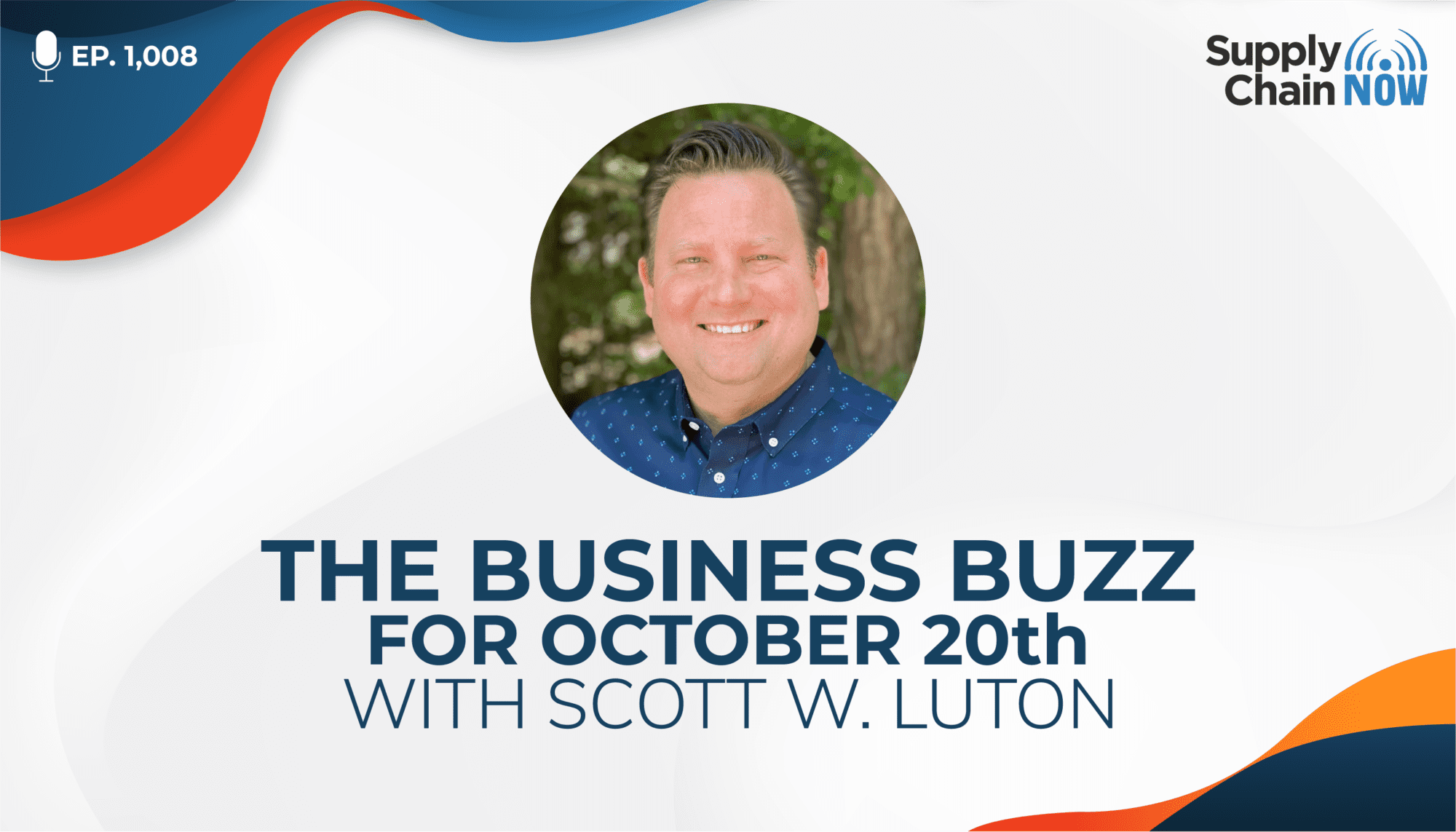Intro/Outro (00:03):
Welcome to Supply Chain. Now the voice of global supply chain Supply chain now focuses on the best in the business for our worldwide audience, the people, the technologies, the best practices, and today’s critical issues, the challenges and opportunities. Stay tuned to hear from Those Making Global Business happen right here on supply chain now.
Scott Luton (00:32):
Hey, good morning. Welcome to the Business Buzz here on Supply Chain. Now this is Scott Luton, your host here. I’ll be sharing a variety of business observations and interesting news stories from across the business world. So welcome to the Business Buzz, and let’s dive on in. Hey, in item number one, today we’re talking about a topic that is keeping business leaders up at night, especially chief information officers that would be cybersecurity. That’s right, as CIOs plan to make cybersecurity their number one priority in 2023. When it comes to budgeting resources, that’s according to Gartner’s latest CIO survey, which is conducted annually and had about 2200 respondents this year. The results were released at the 2022 Gartner IT Symposium Expo in Orlando, 66% of respondents said that they were increasing spending on cyber. In fact, Gartner estimates that spending on information security and risk management worldwide will surpass $188 billion in 2023.
Scott Luton (01:39):
That’s up more than 11% from spending here in 2022. Now, speaking of the IT symposium in Expo, I happen to be at the event with Mark Holmes and our friends at InterSystems. Mark and I both spoke on the immense value of organizations finding that single source of truth that helps power team members with timely, trusted information to make better informed and more timely decisions. Now, item number two, today we’re talking manufacturing, and especially the automotive industry. So according to the Federal Reserve Manufacturing output is at its highest level since 2008. But according to the Wall Street Journal, the man for many goods is expected to wane here in the states, which may cut into those output numbers. Now, one thing that is not waning, the demand for automobiles, which continues to outpace supply, consumers want them. Rental car and transportation fleet managers want them. Everyone wants a new car or truck, But car lots haven’t changed a whole lot in the last couple of years.
Scott Luton (02:49):
Get this, The Fed’s recent index of industrial production shows that 4.7 million fewer light vehicles were assembled here in the US in the last 31 months. Then were assembled in the previous 31 months. So you’ve got low inventories to begin with. And while there have been gains made with semiconductor shortages, we still have a ways to go before that solved. In fact, earlier in October, automaker Lantis cut back on production shifts due to the computer chip shortage. Now, here’s a did you know, the Fed says that the automotive industry, including vehicles assembly and parts production, makes up almost 7% of total manufacturing output here in the US with item number three today. I wanna take just a minute and recognize a dear member of the supply chain now, extended family and a fellow founder and entrepreneur. So Paul Noble and the Veon team recently announced that it has helped its customers across global supply chain manage more than $2 billion of inventory and some 3 million separate SKUs.
Scott Luton (04:03):
The company has developed a popular purpose-built materials intelligence platform and helps companies find the quote material truth. Get this one of Sen’s customers that helps from a Fortune 500 company recently said, quote, The Veen solution found the critical assets we needed to get our assets up and running in three days instead of four plus weeks saving us millions. How about that? And a few days ago, we were able to catch up with Paul Noble over dinner. Paul is founder and CEO of the fast growing company, and he said, quote, Thank you for the shout out from you Scott, and our wonderful fans at Supply Chain. Now, the verisin team is really energized by the momentum we are seeing as we work to solve some of the biggest problems in the market. The supply chain industry is finally ditching their baggage of legacy technologies and embracing ai, and we think we’ve reached a tipping point where they’re understanding and energized by the benefits that AI and our material intelligence is bringing to employees and their bottom line. While it has been a frustrating couple of years of challenges for the industry, we are thrilled to be saving our customers millions and helping ease their material optimization burdens.
Scott Luton (05:29):
A big congrats to Paul Darrell Letty, Mary Kate Crawford, and all of our many friends at Garrison. And hey, we’re encouraging you to keep fighting the good fight to change how business is done, certainly for the better. Now, for item number five, let’s share a few quick hitters across global news. The National Retail Federation’s Global Port Tracker report is projecting that imports coming into major USC ports will be down some 4% in the second half of this year. That volume decrease is being felt in other areas as railroad and trucking volumes have also shown decreases in September. According to a variety of sources, the freight market is cooling, as is the warehousing space. Kushman and Wakefield reports that a record, 148.2 million square feet of logistics space was opened in third quarter 2022. With all that supply and with signs of recession everywhere, vacancy rates are starting to increase.
Scott Luton (06:35):
The supply chain tech investment market has also cooled this year. Startups in this space raised $9 billion in funding in second quarter 2022 down almost 40% from second quarter 2021. The number of deals being made also dropped. They were 243 deals made in a second quarter this year, which was down about 35% from the same time last year. The Mississippi River water levels are close to reaching historic lows, which were set in 1988. In fact, it’s been prompting emergency dredging so that shipping and cruising activity can resume in many areas. Now, speaking of barges and river shipping, here’s, did you know, did you know that it’d take about 940 tractor trailers to carry as much freight as a 15 barge toe on the Mississippi River? So, hey, let’s all pray for some rain, Right? For item number six, a legendary name continues to move into a new era.
Scott Luton (07:39):
Now, several years back, I was fortunate to hear Jack Welch speak in person at an industry event. Of course, most are familiar with this leadership icon, which led General Electric arguably at the company’s peak. Now, GE has changed dramatically, as we all know, in those years since and recently, the company has announced that it intends to sell its fame training campus known worldwide as Crotonville. The 62 acre property has been in operation for more than 65 years and has trained countless thousands of professionals. In fact, Mr. Welch himself would famously give talks in one of the facilities auditoriums nicknamed the Pit. GE has also announced that it will be downsizing. Its company headquarters in Boston. Now, for item number seven, automation is gaining ground across all sectors. Did you know we are in the midst of a nationwide shortage of medical professionals, especially at our pharmacies.
Scott Luton (08:43):
There’s a dearth of pharmacists and pharmacists, technicians. Now, one major brand in this space is turning to automation to help bridge this gap. Walgreens is turning to robotic driven drug filling centers the size of a city block, which they expect to save the pharmacists on staff lots of time, and it could save the company some $1 billion a year, a billion dollars. The Wall Street Journal quoted Walgreen’s Executive Arena Shaw as saying, we looked at our systems and said, Why are we filling prescriptions the way we did in 1995? Hey, that’s a great question arena, and we all should probably be asking that same question in so many aspects of global business and filing today on the business Buzz, let’s all gain some peace of mind in this faith in humanity. Update the power of grace here. In these times, all of us consumers have certainly come to expect instant gratification.
Scott Luton (09:49):
I want what I want at the price, I want it, and the color I want it, and expect to get it same day, okay, next day. But I’m not happy about it. And sometimes despite retail, e-commerce, supply chain team members’ best efforts, that doesn’t happen. So that happened to me recently as our dishwasher finally gave up the ghost. We had been somehow surviving on replacement parts here and there in recent years, but it said the dishwasher that is, Hey, no more, I’m done. And we’ve been stuck washing lots of dishes by hand in recent days. That doesn’t sound bad until you realize just how many dishes three kids can go through in a day. They can stack up taller than Mount Everest in a matter of hours. So as I purchased a dishwasher to be delivered and installed last week, according to the retailer, it all be done in a matter of days.
Scott Luton (10:47):
But after half a dozen calls, I figured out that an inventory system error was not allowing the retailer’s system to notify the third party installer that the dishwasher was ready for pickup delivery. And of course, installation finally exasperated with so much lost time. I opted to visit the store in person where I had made the online purchase and speak, get this with a human in person. Such a novel idea, right? So when I arrived and asked for the customer service associate that I’d been dealing with, I’ll call them Allen, but when Allen came to the counter to talk with me, I could tell that she’d had quite a day already. Alan went ahead and apologized several times, mentioned how much time she’d spent working on it to get it fixed, how she’s trying to get it’s attention to release the order, and so on and so forth.
Scott Luton (11:44):
I could immediately tell it was an earnest response communicated by a tired, hardworking individual, and it really evaporated any sort of frustration that I had as a consumer. So I told her, Hey, it’s no big deal. Just cancel the order. This stuff happens. And most importantly, I told her that I’d be back soon to the store as a customer. I think Alan was surprised by my response, and I bet we’ve all seen some of the heated feedback hurled at the retail workforce by fellow customers, especially in recent years. And while we’re still doing dishes by hand as we find it replacement, I gotta say, it doesn’t build quite as as bad as it did initially. Grace. It’s good to get it, and it’s better yet to give it as often as you can. Well, that does it for this week’s edition of The Business Buzz. Hey, let us know what you think. This is Scott Luton, and on behalf of our entire team here at Supply Chain L, we wish each of you a wonderful week ahead. Hey, do good, give forward, give Grace, be the change that’s needed. And on that note, we’ll see next time, right back here at Apache. Now. Thanks everybody.
Intro/Outro (13:07):
Thanks! For being a part of our supply chain now, community. Check out all of our programming@supplychainnow.com and make sure you subscribe to Supply Chain now, anywhere you listen to podcasts. And follow us on Facebook, LinkedIn, Twitter, and Instagram. See you next time on Supply Chain. Now.



